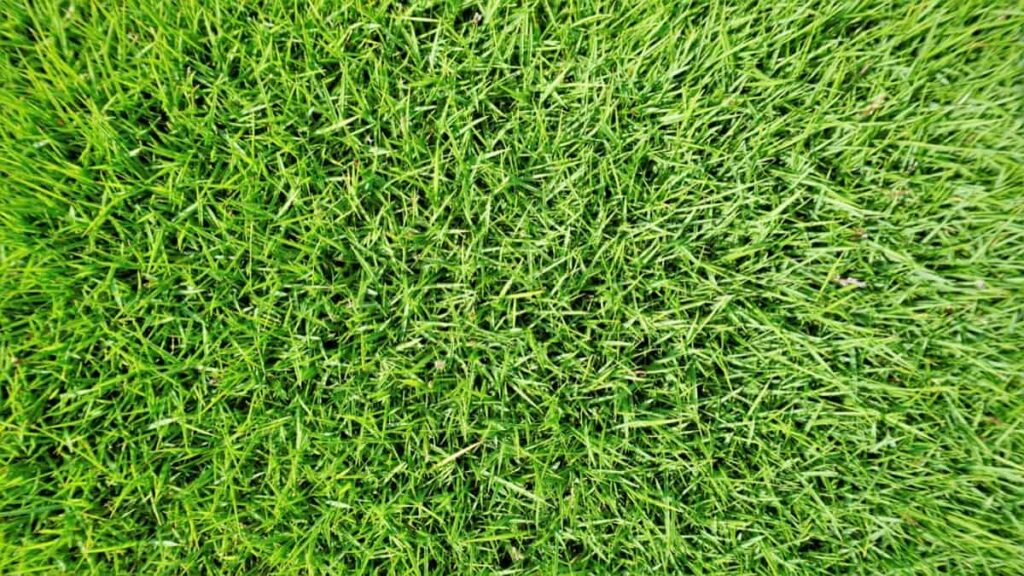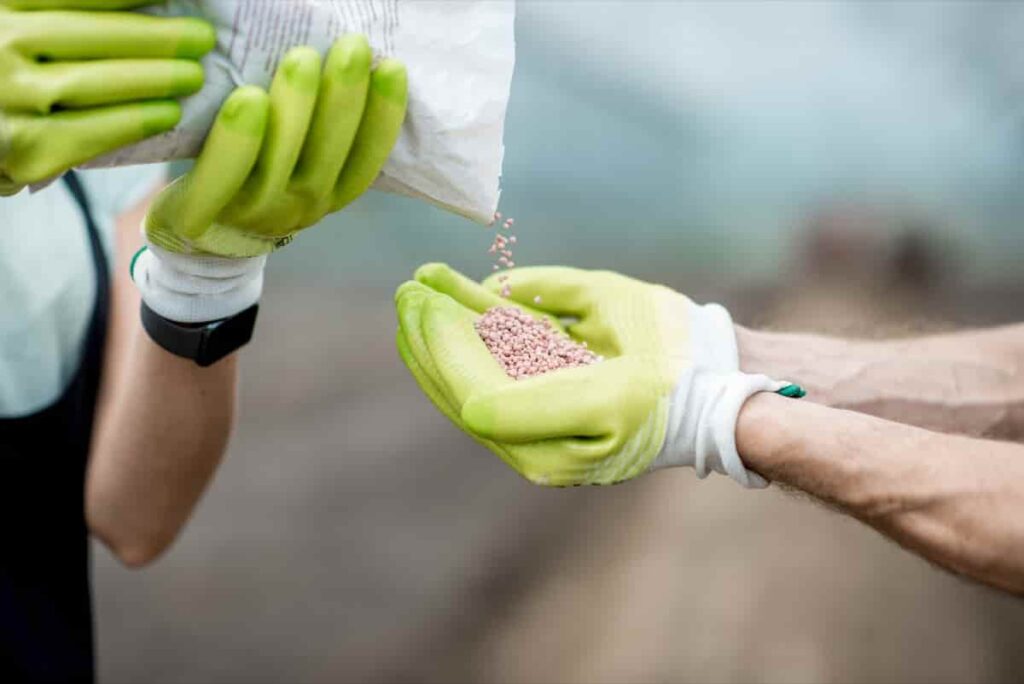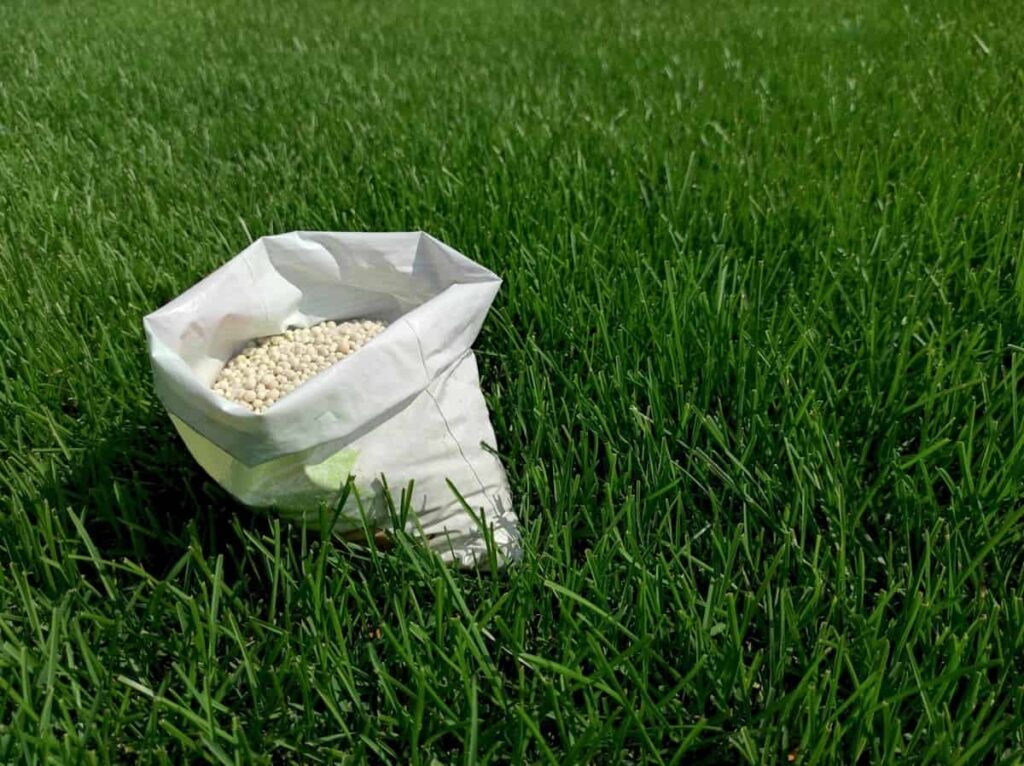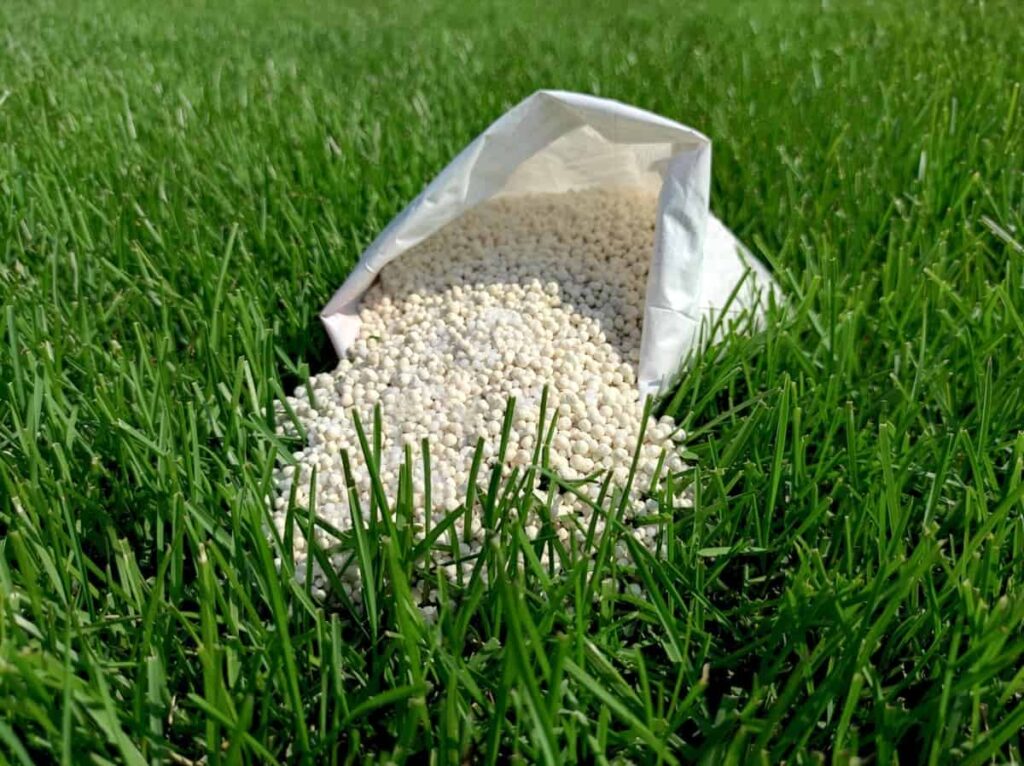Bermuda grass, scientifically known as Cynodon dactylon, is a warm-season turfgrass that originates from Africa. Its fine-textured blades and dense growth habit characterize this grass variety, making it ideal for lawns, parks, athletic fields, and golf courses.

Best Fertilizer for Bermuda Grass
Understanding the Nutritional Needs of Bermuda Grass
Fertilizer application plays a crucial role in promoting the health and vitality of Bermuda grass. By providing essential nutrients, fertilizers help ensure your lawn thrives and maintains its lush green color throughout the growing season. This warm-season grass requires higher levels of nitrogen compared to phosphorus and potassium.
Therefore, selecting a fertilizer with a balanced NPK ratio that meets these specific requirements is important. To ensure a healthy and lush Bermuda grass lawn, it’s important to understand its nutritional needs. This warm-season grass thrives in sunny areas with well-drained soil. Choosing the right fertilizer for your Bermuda grass promotes healthy growth and maintains a vibrant lawn.
Factors to Consider When Choosing Fertilizer for Bermuda Grass
This warm-season turfgrass thrives on nitrogen and requires a balanced ratio of nutrients, including phosphorus and potassium. Considering these requirements will help ensure that your chosen fertilizer provides the necessary elements for optimal growth. Another factor to consider is whether you prefer organic or synthetic fertilizers. Organic options, such as compost or manure-based products, offer slow-release benefits and improve soil health over time. On the other hand, synthetic fertilizers provide quick results but may require more frequent applications.
Additionally, think about whether you want to use slow-release or quick-release fertilizers. Slow-release options gradually release nutrients over an extended period, reducing the risk of burning your lawn with excessive nitrogen. Quick-release fertilizers offer rapid nutrient boosts but require careful application to avoid potential damage. Granular formulations are easy to apply evenly across larger areas, while liquid options allow for precise targeting and quicker absorption by plants.
Organic Fertilizers for Promoting Healthy Bermuda Grass Growth
Organic fertilizers offer a natural and environmentally friendly way to promote healthy growth in Bermuda grass. These are derived from animal or plant sources, such as compost, manure, or seaweed. They provide essential nutrients that support the overall health of your lawn without the use of synthetic chemicals. The main advantage of organic fertilizers for Bermuda Grass is their ability to improve soil structure and fertility. They help increase soil microbial activity, enhancing nutrient availability at the grassroots.
This leads to stronger root development and better absorption of water and nutrients. In addition to providing nutrients, organic fertilizers contribute to soil health by improving its moisture retention capacity. This can be particularly beneficial for Bermuda grass, which thrives in well-drained soils but still requires adequate moisture during hot summer. Choosing an organic fertilizer for your Bermuda grass improves its appearance and supports its long-term health while being mindful of environmental considerations.
In case you missed it: How to Grow Super Napier Grass: A Guide to Planting to Harvesting

Synthetic Fertilizers: Pros and Cons for Bermuda Grass
Synthetic fertilizers have become popular for many lawn owners to promote healthy Bermuda grass growth. These fertilizers are made from chemical compounds that provide essential nutrients to the grass, such as nitrogen, phosphorus, and potassium. They release nutrients quickly, allowing Bermuda grass to absorb them rapidly and showing visible results in greener color and faster growth.
This can be particularly beneficial if you’re looking for quick improvements in your lawn’s appearance. Synthetic fertilizers often come in granular or pellet form, making them easy to spread evenly across large turf areas. They also typically have a longer shelf life compared to organic options.
On the other side, synthetic fertilizers can leach into groundwater or run off into nearby water bodies if not applied correctly or during heavy rainfall. This can contribute to pollution and harm aquatic ecosystems. Additionally, excessive use of synthetic fertilizers can lead to an imbalance in soil pH levels over time, affecting overall soil health and nutrient availability for Bermuda grass roots.
Slow-Release Fertilizers: A Wise Choice for Bermuda Grass
Slow-release fertilizers are popular among lawn enthusiasts who want to provide their Bermuda grass with a steady nutrient supply over an extended period. These are designed to release nutrients slowly into the soil, ensuring that the grass receives a continuous and consistent dose of essential elements.
By gradually releasing nutrients, these fertilizers minimize waste and maximize absorption by Bermuda grass roots. Additionally, slow-release fertilizers promote more balanced growth in Bermuda grass than quick-release options. This controlled release allows for sustained nitrogen uptake without causing excessive top growth or stress on the plant. The result is healthier, stronger turf that can withstand environmental challenges like drought or disease.
Quick-Release Fertilizers: Providing Rapid Nutrient Boosts to Bermuda Grass
Quick-release fertilizers are popular for those looking to give their Bermuda grass a rapid nutrient boost. These fertilizers are designed to deliver nutrients quickly, providing immediate results for your lawn. These fertilizers typically contain high nitrogen levels, essential for promoting healthy growth in Bermuda grass. The fast-acting nature of these fertilizers means you’ll start seeing results within days, with increased growth and improved overall health.
However, it’s important to note that while quick-release fertilizers offer immediate benefits, they may not have long-lasting effects compared to slow-release options. This means you may need to apply quick-release fertilizer more frequently throughout the growing season to maintain optimal nutrient levels in your Bermuda grass.
When using quick-release fertilizers on Bermuda grass, following the application instructions carefully is crucial. Applying too much fertilizer or not watering adequately can lead to burning or damaging your lawn. It’s always best practice to consult with professionals or refer to manufacturer guidelines before applying fertilizer.
In case you missed it: How to Harden Off Seedlings Quickly: Techniques, Process, and Steps Involved

Balanced NPK Ratios for Optimal Bermuda Grass Health
For Bermuda grass, a balanced NPK ratio can make all the difference. A ratio of 16-0-8 contains 16 percent nitrogen, no phosphorus, and 8 percent potassium. This specific combination provides just what your Bermuda grass needs to thrive. Nitrogen is responsible for enhancing your turf’s green color and overall growth. Phosphorus and potassium are also vital for Bermuda grass development.
Nitrogen-Rich Fertilizers: Enhancing Green Color and Growth of Bermuda Grass
Nitrogen is an important element for the growth and development of Bermuda grass. Nitrogen-rich fertilizers are specifically formulated to provide an ample supply of this essential nutrient to promote optimal growth. When applied correctly, nitrogen-rich fertilizers stimulate rapid blade growth, resulting in a denser turf with improved coverage. The increased nitrogen levels also help Bermuda grass compete against weeds by creating a more robust and vigorous root system.
Applying too much nitrogen can lead to excessive top growth without sufficient root development, making the grass susceptible to drought stress and disease. To achieve the best results, it’s recommended to follow manufacturer instructions regarding application rates and timing. This will ensure that your Bermuda grass receives just the right amount of nitrogen for optimum health and vitality.
Phosphorus and Potassium: Essential Nutrients for Bermuda Grass Development
Phosphorus promotes root growth, improves plant vigor, and enhances stress tolerance. Potassium, on the other hand, helps regulate water movement within Bermuda grass plants. It strengthens cell walls, improves disease resistance, and enhances drought tolerance. Potassium also assists in protein synthesis and enzyme activation.
Micronutrients in Fertilizers: Supporting Overall Health of Bermuda Grass
One important micronutrient that is vital for Bermuda grass is iron. Iron helps in chlorophyll production, which gives the grass its vibrant green color. Without sufficient iron levels, Bermuda grass can become pale or yellowish. Another key micronutrient for Bermuda grass is zinc. Zinc promotes root development and enhances the plant’s ability to absorb nutrients from the soil. It also aids in carbohydrate metabolism, contributing to healthier growth. Manganese is yet another micronutrient that supports optimal Bermuda grass health.
Manganese assists in enzyme activation and plays a significant role in photosynthesis, ensuring proper energy production within the plant. Copper is another essential micronutrient for Bermuda grass as it improves disease resistance and strengthens cell walls. Copper deficiency can make your lawn susceptible to diseases like brown patches. Boron is necessary for healthy reproductive processes in plants, such as pollination and seed formation. It also aids nutrient uptake by regulating membrane functions within cells.
Granular Fertilizers vs. Liquid Fertilizers for Bermuda Grass
Granular fertilizers are solid particles easily spread across your lawn using a fertilizer spreader. Additionally, granular fertilizers are generally more cost-effective than liquid ones. On the other hand, liquid fertilizers offer quick absorption and immediate results. They can be easily applied with a sprayer or hose attachment, allowing for targeted application in specific areas.
In case you missed it: Best Fertilizer for Curry Leaves in Pots: Organic, Natural, Homemade, NPK, When and How to Apply

Liquid fertilizers also tend to provide more uniform coverage compared to granules. The choice between granular and liquid fertilizers depends on your needs and preferences. If you want long-lasting nutrient release and cost-effectiveness, go with granular fertilizer. But if you want quick results and precise application control, opt for liquid fertilizer.
Pre-Emergent Herbicides with Fertilizer Benefits for Weed Control in Bermuda Grass
Pre-emergent herbicides are an effective tool for controlling weeds in Bermuda grass lawns. Not only do they target existing weeds, but they also prevent new ones from sprouting. This is crucial for maintaining a healthy and weed-free lawn. These herbicides not only kill weeds but also provide essential nutrients to promote the growth of Bermuda grass. It’s like getting a two-for-one deal!
When choosing a pre-emergent herbicide with fertilizer benefits, it’s important to consider the NPK ratio (nitrogen, phosphorus, and potassium). Look for a balanced ratio that meets the nutritional needs of Bermuda grass. A high nitrogen content will help enhance green color and growth.
Post-Emergent Herbicides: Combating Weeds without Harming Bermuda Grass
Post-emergent herbicides target and eliminate existing weeds while leaving your Bermuda grass unharmed. These herbicides target the leaves of the weeds, effectively killing them off without affecting the root system or growth of your Bermuda grass. They can be used on various types of weeds commonly found in lawns, including broadleaf weeds like dandelions and clover, as well as grassy weeds such as crabgrass and annual bluegrass.
When applying post-emergent herbicides, follow the instructions carefully regarding dosage and timing. It’s crucial not to exceed recommended rates or apply when Bermuda grass may be stressed (such as extreme heat or drought conditions).
Best Time to Fertilizer Application to Bermuda Grass for Maximum Effectiveness
Applying fertilizer during the optimal period is important to achieve maximum effectiveness and ensure a lush, green lawn throughout the summer months. Generally, the best time to fertilize Bermuda grass is from March through August. This corresponds with its peak growth season when it thrives in warm weather conditions.
In case you missed it: Unlocking the Secrets of Optimal Fertilizer Requirements for Potato Crop

By providing nutrients during this timeframe, you’re giving your Bermuda grass the boost it needs to stay healthy and vibrant. Typically, 3-4 fertilizer applications are sufficient for maintaining a beautiful Bermuda grass lawn. These applications should be spaced evenly throughout the growing season to provide consistent nourishment without overwhelming the grass.
Frequency of Fertilization for Maintaining Lush Bermuda Grass Lawns
Maintaining a lush Bermuda grass lawn requires regular fertilization to ensure it receives the nutrients it needs to thrive. The frequency of fertilization will depend on several factors, including the health and condition of your lawn, soil quality, and climate. Generally, fertilizer is recommended to be applied to Bermuda grass 3-4 times per year. This allows consistent feeding throughout the growing season and helps promote healthy growth.
However, it’s important not to overdo it with excessive fertilizer applications as this can lead to nutrient imbalances or even damage to the grass. Remember that every lawn is unique, so consider conducting a soil test before applying fertilizer. This will provide valuable information about nutrient levels and pH balance, allowing you to tailor your fertilization schedule accordingly.
Environmental Considerations When Choosing Fertilizer for Bermuda Grass
Organic fertilizers have minimal environmental impact. They are typically made from composted materials or plant by-products, making them safe for your lawn and the surrounding ecosystem. In contrast, synthetic fertilizers have a greater negative impact on the environment.
These fertilizers often contain high nitrogen levels, which can lead to runoff into water sources and contribute to pollution. Additionally, looking at NPK ratios when selecting a fertilizer for Bermuda grass is important. Opting for a balanced ratio that suits Bermuda grass’s specific needs will promote healthy growth without unnecessary nutrient waste.
Mistakes to Avoid When Applying Fertilizer to Bermuda Grass
- Over-fertilization: Many homeowners make the mistake of thinking that more is better when fertilizing their lawns. However, over-fertilization can result in excessive growth and weaken the grass over time.
- Uneven application: It’s important to apply fertilizer evenly across your lawn. This will help prevent patchy areas where the grass may receive too much or too little nutrients.
- Ignoring soil testing: Before applying fertilizer, it’s crucial to test soil nutrient levels and pH balance. Neglecting this step may lead to unnecessary applications of certain nutrients and imbalances in soil chemistry.
- Incorrect timing: Timing is everything when it comes to fertilizing Bermuda grass. Applying fertilizer during dormancy periods or extreme heat can stress the grass and hinder its growth.
- Using the wrong fertilizer: Not all fertilizers are equal, and using the wrong type for your specific needs can negatively affect your Bermuda grass. Select a fertilizer specifically formulated for Bermuda grass with appropriate NPK ratios.
In case you missed it: Best Fertilizers for Raised Bed Garden: When and How to Apply

Bermuda Grass Fertilization Schedule
| Nitrogen | 1 pound of nitrogen for 1,000 square feet |
| Best time | March through August |
| NPK ratio | 16-0-8 |
| Fertilizer application | 3-4 applications of fertilizer |
Conclusion
By providing essential nutrients, fertilizers help to promote healthy plant growth and enhance the overall appearance of Bermuda grass lawns. One of the main benefits of using fertilizer on Bermuda grass is that it helps to improve its root development. Strong roots are crucial for withstanding drought conditions and allowing the grass to recover quickly after stress or damage. Fertilizer also plays a key role in promoting lush green color in Bermuda grass.
- Management Pests and Diseases in Your Cotton Field
- Sheep Farming Business Plan for Beginners
- Aquaponic Farming at Home: A Step-By-Step Guide
- Profitable Village Farming Business Ideas in 2024
- High-Yield Aquaculture: Fast-Growing Fish for Farming
- Effective Fish Pond Construction Techniques for Beginners
- Irrigation and Water Management in Pineapple Farming
- Blossom to Harvest: Mastering Flowering and Pollination in Papaya Farming
- Pig Fattening Essentials: From Selection to Sale for Beginners
- Raising Wagyu Cattle: A Complete Guide for Premium Beef Production
- Soil Types and Their Water Holding Capacity
- Optimizing Irrigation Schedules for Coconut Groves for Enhanced Yield
- Espresso Your Garden: Coffee Grounds for Healthier Acid-Loving Plants
- The Best Soil Mix for Snake Plants: How to Mix Your Own Snake Plant Soil
- Green Thumb Success: Expert Tips for Cultivating Greenhouse Beans All Year Round
- Bloom All Year Round: The Ultimate Guide to Indoor Hyacinth Care
- Eco-Friendly Gardening: How to Make Liquid Fertilizer from Kitchen Waste
- Ultimate Guide to Grow Anise in Pots: Explore Seed Propagation to Harvesting
- Guide to Raising Chester White Pigs: Discover Breed Facts to Growth Management
- Mastering the Elegance: The Ultimate Guide to Weeping Cherry Tree Care, Planting, and Maintenance
- Ultimate Guide to Planting Garlic in Grow Bags: Growing Strategies for Beginners
- How to Fix Spider Plant Leaf-Related Problems: Natural and Organic Remedies
- 10 Reasons Why Your Tulsi Plant is Shedding Leaves: Home Remedies and Solutions
- Optimizing Growth and Yield: The Advantages of Palm Bunch Ash Fertilizer
- Utilizing Neem Oil Extract as a Natural Pesticide for Hydrangea
- From Soil to Harvest: Various Ways in Which Farmers Can Use AI Tools
- Steps to Encourage and Induce Citrus Flowers: A Comprehensive Guide
- How to Fix Snake Plant Leaf-Related Issues: Natural and Organic Remedies
- Transform Your Garden into a Fragrant Oasis with Raat Ki Rani (Night Blooming Jasmine)
- Discover the Ideal Chicken Breeds for Philippine Farms
- How to Create a Poultry Egg Farm Business Plan for Profits
- Grow Lemon Cucumbers Like a Pro: Insider Techniques for Bountiful Yields
- Ultimate Guide to Caring for Your Pink Princess Philodendron: Tips for Thriving Variegation
- Areca Nut Profit Per Acre: Calculating Yield and Cost of Cultivation
- How Kaveri Chicken is Becoming a More Profitable Breed in Indian Backyards
- Transform Your Barn: 9 Steps to Convert a Horse Stall into a Chicken Coop
